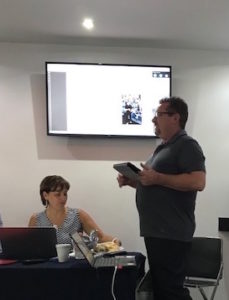John was recently working (and hiking) in Asheville, North Carolina for a sales training workshop. Asheville is known for the Blue Ridge mountains, a vibrant arts scene and historic architecture, including the dome-topped Basilica of Saint Lawrence. The vast 19th-century Biltmore estate displays artwork by masters like Renoir. And more importantly, it’s in the home state of John’s lovely wife, Septembre.
Archive for month: July, 2018

Transitioning a sales person to a sales manager
Transitioning A Salesperson To A Manager’s Role
One of the most costly mistakes in business is to promote your most successful sales person only to find that they fail as a manager. What makes this even more disheartening is that you may also lose some of the revenue from that producer’s territory. Sales people are promoted because they have performed well and management mistakenly believes that the super star sales person is also a great manager and trainer. Too often, the great sales person doesn’t even realize what they are doing different. They may be intuitive or just particularly committed to cold calling or business development. It is not uncommon that the sales person doesn’t really understand what behaviors have lead to above average results.
Being a super sales person and being a great manager often have traits that are diametrically different. The successful sales person is usually easy to engage and empathetic with customers. The really great ones are excellent listeners. The exceptional sales manager is more analytical in that they can evaluate how effectively a sales person is executing their sales process and then provide concrete, specific feedback and exercises that will lead to improvement. The listening skill that might have made them a great sales person is often a trait that enhances success as a sales manager. Larry King is credited with saying “I never learned anything while I was talking” and his words are well worth considering.
The sales manager that says, “Watch how I do it” is often using his personal skills to role model behaviors and that field experience is valuable but of only limited value. Sales managers need to be coaches to be successful. Few football coaches are world class quarterbacks, kickers or tight ends. The way that a coach is able to field a winning team is to be able to assess the strengths and weakness of each player, to be able to diagnose the appropriate development and course of action and to be able to communicate the recommended changes in a manner that is clear and compelling. If the sales manager is not able to change the attitudes and the behaviors of the sales team, it is questionable if the performance of the team will improve. Think about the skill set required to change attitudes and behaviors. That skill set may not be the same one that was able to close enough deals to get the salesperson promoted to sales manager.
Transitioning managers to a coaching role is the key to upgrading the collective results of the team. Is the manager providing the appropriate development for the team and addressing individual needs? Is the manager asking the right questions? Is the manager effectively listening? Is the manager good at making accurate assessments? Does the manager use a sales process as his playbook and work with the team to practice the process?
The manager as coach analogy is a good one although there are many playback videos of sales people performances to assess. Start by asking sales people specific questions:
- What does a qualified prospect look like?
- Who needs to be involved in the final decision that will lead to an order?
- What’s the cost to the buyer of not making a change?
- What value does the buyer/prospect see in your offering?
- How are we positioned against our competition?
The answers to these types of questions will enable the manager to make an assessment of how best to coach the sales person to success. Increasing the overall effectiveness of the sales organization is the primary goal of the sales manager. A sales manager that is a good coach is most likely to lead his team to greater success.

About Precor
Precor is a fitness equipment manufacturer and health solutions provider based in Woodinville, Washington. The company is one of several brands in the sporting goods portfolio of Amer Sports based in Helsinki, Finland.
How FSS Helped Precor
For two and half years, Flannery Sales Systems (FSS) provided Precor with content, instruction and coaching services to support a global rollout of the Precor Sales Process (PSP). The program was deployed to 14 countries to enable a consistent way for Precor sales teams to engage with customers in key markets. FSS provided Precor with a global training structure which has been vital in gaining field alignment and propelling sales results.
During year three, Precor brought the program in house, enabling a small team of their own employees to be responsible for the implementation of the PSP. FSS partnered with Precor to identify credible internal evangelists in order to ensure a successful migration. The PSP leaders were responsible for delivering customized training material for each of their regions. They came from different customer-facing departments such as Global Sales, Marketing and Sales Operations, and each provided a unique insight into customer requirements.
When FSS interviewed these leaders, they emphasized the importance of staying focused on the ultimate goal, which was to deliver an exceptional customer experience. They emphasized that old school sales tactics like product pushing had no place in their sales process. Precor sales teams had to focus on listening and fully understanding customers’ most important business needs.
“Shifting from a product first, product-only conversation to a focus on learning what the customer wants to achieve with their business has been huge” said Dan Albaum, Precor Global Marketing Director. “These deep insights are reflected in all of our marketing content and sales support tools, which are designed to nurture our customer relationships.”
One of the key differentiators of the PSP was the Meeting Summary (MS). It is is what really set Precor apart from its competition. First if all, It helped to raise the customer’s confidence in the sales rep. In addition, it allowed managers to coach their team members through each opportunity in order to reinforce skill development. As a result, better opportunities were developed, and the overall health of the revenue pipeline increased.
A Precor Channel Partner enthusiastically agreed, stating “I started to notice that I am using the MS in my long-range pipeline to ask better questions and follow through more completely. I have found that reviewing closed sales is always worth the extra time.”
Guy Williams, Precor Global Director of Networked Fitness Sales, said the following key factors of the PSP have been the primary reasons that Precor direct and channel partner sales teams have been able to meet and exceed customer expectations:
- Tight go-to-market alignment through stronger cross-functional engagement from all Precor customer-facing roles and across all executive levels
- Defined metrics and documentation that build accountability and more effective coaching
- Strong focus on process — a commitment to hard work in training workshops translates to sales success in the field
As Guy pointed out, “there is no substitute for live role playing.”
In addition to benefitting Precor direct sellers, the PSP also had many advantages for Channel Partners. A Precor Channel leader in North America pointed out, “the PSP provides the overall structure and related sales skills for gathering pertinent customer information and confirming that information with the prospect. This leads to an opportunity offer relevant and timely value with specific Precor solutions.”

A few years ago, I received a LinkedIn message that said “Hi John, if you are in Bhopal (India) next week, let’s meet for a drink.” It was a curious invitation, as I wasn’t anywhere near the Asian subcontinent. But then I figured it out….
John L. Flannery ran the business unit for General Electric (GE) in India from 2009.Someone mistook me for him when sending the request to meet. I had heard of John from a friend who worked for GE, but the surfacing of our shared name really became more prevalent when he was promoted to CEO of all of GE in August of 2017. Similar name, different lives.
While the core name is the same, there are differences in between the middle names/initials of the “E” and the “L”. L grew up in VA, went to Wharton, has 3 kids and enjoys the Boston Red Sox. E grew up in PA, went to San Diego State University, has 2 kids and loves the Super Bowl Champs Eagles.
On my way through the Charlotte airport recently, L was being interviewed on MSNBC, so I had the attached picture taken. There is no real resemblance between us, but I am sure we can trace some connection back to Ireland in the middle of the 19th century. For now, I have a call into L’s office to see if he wants to catch up for a drink- we shall see what happens.
